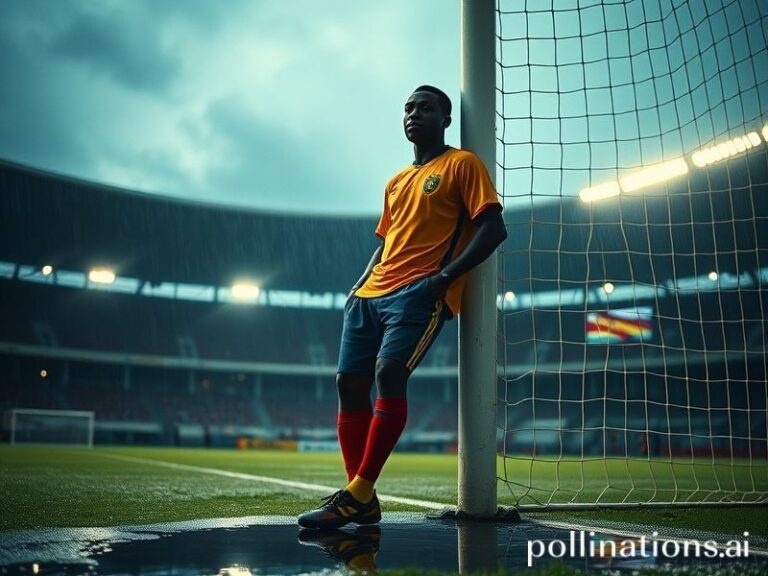Umtiti’s Knee: A Tragicomedy of Globalized Sports and Human Frailty
Umtiti: A Knee, a Contract, and the Slow-Motion Car Crash We All Watched Together
By Dave’s International Desk
Somewhere between the soy-latte utopia of Barcelona’s Eixample and the fluorescent purgatory of a Qatari physio room, Samuel Umtiti’s left knee became a global Rorschach test. To culés it was betrayal in ligament form; to accountants in Zurich, a depreciating intangible asset; to the rest of us, a timely reminder that every human body—no matter how expensively insured—has a sell-by date that sneaks up like a pickpocket in La Rambla.
The French defender’s once-bulletproof reputation disintegrated in increments so leisurely you could set your Swiss watch to them. After the 2018 World Cup—where he essentially turned his kneecap into a national sacrifice so Les Bleus could parade down the Champs-Élysées—Umtiti returned to Camp Nou with cartilage that resembled a trampled croissant. Barcelona, still dizzy from the Neymar sugar-rush, rewarded him with a five-year extension generous enough to make a hedge-fund dentist blush. The club’s bean-counters celebrated by booking another private jet, because nothing says sustainable finance like burning 2,000 liters of kerosene to scout a 17-year-old who’s good at TikTok.
Fast-forward through three seasons, 47 collective appearances, and roughly €72 million in amortized wages, and Umtiti became football’s most expensive cautionary tale since the last one. Loan spells in Lecce and Riyadh followed, each greeted with the enthusiasm usually reserved for a delayed subway announcement. In Italy they praised his “Roman-profile elegance” as he jogged—yes, jogged—past bemused defenders who looked like they’d been told their espresso machine was broken. In Saudi Arabia his medical consisted mainly of proving he could still point to Mecca without wincing. Humanity’s shared capacity for hope is touching, really.
Yet zoom out and Umtiti’s saga is less about one man’s synovial fluid and more about the planetary compulsion to monetize cartilage before it liquefies. From Los Angeles to Lagos, every sports franchise now employs biometric analysts who speak of “load management” the way medieval monks once debated angels on pinheads. The athlete is no longer a person but a bundle of future earnings wearing Nikes. When the bundle tears, the spreadsheet turns red—like a Bloomberg terminal discovering democracy. Fans, high on tribal serotonin, demand either immediate resurrection or ritual sacrifice; there is no middle ground, only the binary of contract extensions or public shaming on five continents simultaneously.
Globalization has turned the knee into a geopolitical bargaining chip. Qatar’s Aspire Academy reportedly offered Umtiti a “cultural ambassadorship” in exchange for rehabbing under their desert heat lamps, presumably next to the air-conditioned World Cup stadiums nobody uses on Tuesdays. Meanwhile, FIFA’s glossy concussion protocols—written in six languages and ignored in seven—sit on a server somewhere in Zurich, quietly auto-renewing like a gym membership no one admits to owning. The entire circus travels together: the surgeons, the PR flacks, the crypto-shirt sponsors whose logos peel off in the humidity like a bad conscience.
What, then, is the broader significance of Samuel Umtiti’s slow-motion car crash? Simply this: we have engineered a world where a 29-year-old’s patellar tendon can send fiscal shockwaves from Catalonia to Singapore, yet we still can’t agree on how many extra minutes the fourth official should add when the VAR booth is busy ordering sushi. It’s a masterclass in modern priorities—like installing mood lighting in a burning building. The next time you watch an athlete clutch a joint and stare into the existential abyss, remember you’re not just witnessing biology; you’re watching a live audit of late-capitalist hubris, narrated by a commentator who just pronounced “meniscus” three different ways.
Umtiti will limp off into punditry or vineyard ownership, and the machine will keep lurching forward, hungry for the next pristine set of ligaments. The rest of us will update our fantasy-league lineups and pretend we didn’t see the fine print that says collateral damage may include a human soul. That’s the deal we signed—no refunds, no substitutions, extra time at the discretion of the invisible hand.







